REZULTĀTI/RESULTS
Uzstāšanās konferencēs/Conferences:
- Dace Balode “Between Two Worlds: Women on Gender in Latvian Churches”, International Sociological Association Research Committee on the Sociology of Religion (RC 22) starptautiska konference “Religion, Politics and Uncertainty: Shifting Boundaries”, 11. - 13. novembris, 2021, Viļņa, Lietuva.
- Aivita Putnina “Fading Visibility of Women: Understanding of Gender in the Latvian Evangelical Lutheran Church”, International Sociological Association Research Committee on the Sociology of Religion (RC 22) international conference “Religion, Politics and Uncertainty: Shifting Boundaries”, 11. - 13. novembris, 2021, Viļņa, Lietuva.
- Ilva Skulte and Sofija Kozlova “Polarization of Discourse about Gender Roles, Family and Violence in Discussions about Istanbul Convention in Latvian Internet Media”, International Sociological Association Research Committee on the Sociology of Religion (RC 22) international conference “Religion, Politics and Uncertainty: Shifting Boundaries”, 11. - 13. novembris, 2021, Viļņa, Lietuva.
- Ģirts Rozners “Fundamentalism and Women: Report on the Understanding of Gender Roles in Latvian Evangelical Churches”, International Sociological Association Research Committee on the Sociology of Religion (RC 22) international conference “Religion, Politics and Uncertainty: Shifting Boundaries”, 11. - 13. novembris, 2021, Viļņa, Lietuva.
- Laima Geikina “The intersection of religious and citizenship education in Europe: Case of Latvia”, International Sociological Association Research Committee on the Sociology of Religion (RC 22) starptautiska konference “Religion, Politics and Uncertainty: Shifting Boundaries”, 11. - 13. novembris, 2021, Viļņa, Lietuva.
- Dace Balode & Marianne Bjelland Kartzow “Intersectional grassroot reception: The use of the Bible in discourses of gender equality”, 20th Annual Conference of the European Association for the Study of Religions. RELIGIONS AND TECHNOLOGIES, 4.- 8. septembris, 2023, Viļņa, Lietuva.
- Aivita Putniņa “Negotiation Religion and Gender around the Baltic Sea in the Age of Technologies” 20th Annual Conference of the European Association for the Study of Religions. RELIGIONS AND TECHNOLOGIES, 4.- 8. septembris, 2023, Viļņa, Lietuva.
- Ģirts Rozners 20th Annual Conference of the European Association for the Study of Religions. RELIGIONS AND TECHNOLOGIES, 4.- 8. septembris, 2023, Viļņa, Lietuva.
AIZVADĪTIE PASĀKUMI/EVENTS
- 2021. gada 28. maijā attālināti tika noturēts seminārs "How do we study Gender in Diverse Social Contexts?" Vairāk par semināru.
- 10. un 11. februārī Latvijas Universitātē klātienē un attālināti tikās projekta "Reliģija un dzimumu līdztiesība: norises Baltijā un Ziemeļvalstīs" komanda, kurā piedalījās socologi, antropologi, mediju speciālisti, reliģijas pedagogi un teologi no Lietuvas, Igaunijas, Norvēģijas un Latvijas. Pētnieki pārrunāja sākotnējās atziņas, ko ir guvuši no literatūras apkopojuma, intervijām, mediju apskata un skolu grāmatu analīzes. Viens no interesantiem novērojumiem bijis par to, ka, piemēram, jautājumi par dzimti Baltijas valstu pētniecībā ir maz apskatīti un lielākā daļa ir saistīta ar ārpus Latvijas finansējuma atbalstu. Tāpat arī saistošs bija vērojums, ka liela daļa intervēto personu, dzimumlīdztiesību saprot kā dzimumvienādošanu. Pētnieki arī uzstādīja jautājumu, ko tad saprast ar taisnīgumu dzimtes jautājumos? Kā definēt taisnību, taisnīgumu šajā aspektā? Vai vienāda izturēšanās pret dažādajiem, arī pret dažādi neaizsargātajiem ir taisnīgums? Šos un citus jautājumus pētnieki risinās tālāk savā darbā projekta ietvaros sadarbojoties pāri atsevišķo valstu robežām.
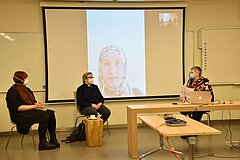
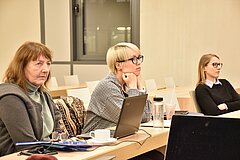
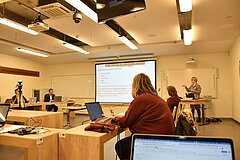
- Starptautisks simpozijs "Religions, Gender, and 'Genderism': Interactions Shapin Gender Equality", 6. un 7. oktobris Viļņa, Lietuva. Simpozija galvenais mērķis bija diskutēt par to, kā reliģija, dzimums un "genderisms" mijiedarbojas mūsdienu sabiedrībā, lai veidotu priekšstatus par un veicinātu rīcību, kas ņemtu vērā dzimumu līdztiesību. Pēdējo desmit gadu laikā publiskajā diskursā ir pieaugusi pret dzimumu vērsta retorika, un pretestība "genderismam" ir veidojusi sabiedriskās debates un politiskos pasākumus. Turklāt nozīmīga loma šādos procesos ir bijusi gan reliģiskām personām, gan reliģiskām organizācijām. Dažādas reliģiskās organizācijas bieži ir identificējušas “genderismu” kā dzimumu līdztiesības politiku, dzimumu pētījumus un ar dzimumu saistītus jautājumus. Šis simpozijs atspoguļoja teorētiskos un empīriskos pētījumus, kas veikti starptautiskā pētniecības projekta “Reliģija un dzimumu līdztiesība: Baltijas un Ziemeļvalstu attīstība (ReliGen)” ietvaros. Simpozija programma.
- ReliGen projekta pētnieku tikšanās Tallinā, 2023. gada 20. un 21. aprīlī. Tikšanos organizēja Tartu Universitāte un tajā piedalījās pētnieki no Lietuvas, Latvijas, Igaunijas un Norvēģijas. Vairāk informācijas par tikšanos atradīsiet ReliGen tīmekļa vietnē.
- Seminārs projekta sociālajiem partneriem: 2023. gada 22. novembrī, LU Teoloģijas fakultātes telpās, zinātnieku darba grupa aicināja savus sociālos partnerus un potenciālos pētījuma rezultātu ieguvējus no nevalstiskajām organizācijām, reliģiskajām organizācijām, Rīgas domes un Latvijas republikas Saeimas, kā arī studentus uz projekta rezultātu prezentāciju, semināru un diskusiju. Jautājumu un atbilžu sadaļā norisa dzīva diskusija gan par pētījuma atradumiem, rezultātiem un sasāpējušiem jautājumiem dzimumu līdztiesības jomā saistītajās nozarēs. Semināra prezentācija.
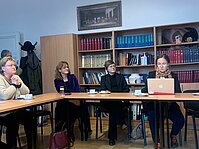
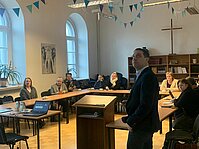
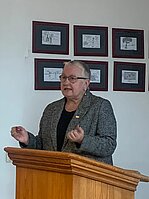
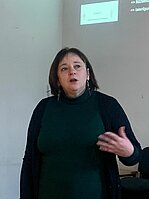
ZINĀTNISKO RAKSTU KOPSAVILKUMI/ABSTRACTS OF SCIENTIFIC ARTICLES
Dace Balode (Latvijas Universitāte), Egdunas Račius (Vītauta Dižā universitāte)
Experience and expectations of Muslim gender roles in the Baltics: the "subaltern" voices in the face the public discourse
Women of Muslim background living in the Baltics, like others, are oft confronted with images of perceived gender roles in Muslim communities and societies. But they, unlike non-Muslims, have their own take on these images, partially stemming from their personal experiences and religious convictions but also as response, sometimes unrealized, to the public discourse. Through their narrations, these women, on their own examples, apparently seek to deconstruct the images of gender relations among Muslims.
On the other hand, it is mainly through mass media that ordinary citizens are familiarized with cultural traditions and habits of distant societies. In the Baltics, much of the reporting on the Muslim societies and their cultures is done by journalists who themselves often lack informed understanding of the complex realities of the societies they report on. Consequently, much of information is in fact mis-information based on biases, a priori opinion and the like. Reports on such sensual issues as gender relations and sexuality among Muslims are especially on demand. As such, they serve to reproduce and recycle widely held Orientalist tropes on Islam and Muslim cultures, one feature of which is the othering and exoticization of Islam and Muslim cultures.
The present paper, based on in-depth interviews, does not only show the plethora of positions of women of Muslim background living in the Baltics on gender roles among Muslims but also compares how their positions oppose or conform to the images held in the public and recycled in the media.
Dace Balode (Latvijas Universitāte), Marianne Bjellands Kartzow (Oslo universitāte)
Intersectional grassroot reception: The use of the Bible in discourses of gender equality
What sources of authority can be found when religious women are invited to talk about gender equality? In this article, we pay attention to interviews with a variety of Latvian women, and we observe that they often employ the Bible to think with. How do they argue and conceptualize, and where do their ideas come from? From these interviews, we can deduce what we call “a biblical reception of the grassroots,” which sometimes differs from the official confessional and religious community settings. Therefore, our aim is to explore what kind of concepts and sources women employ in discourses of gender equality and religion. We will focus on women's statements about scriptures, how they use and understand these texts, and how they interpret them in relation to gender equality.
In the overall material, both patterns and particular cases are of great interest: So far, observations show that the understanding of gender roles of women interviewed are based in very general, even stereotypical, assumptions, as well as referring to writings and religious authorities. Both these ways of dealing with – or not - sacred scriptures related to issues of gender equality in a religious setting appear free and independent, granting these women religious agency. They construct their ideas by help of the bible and authoritative texts when they want to, but can also talk freely on their own behalf. Within the theoretical framework of gender theory, intersectionality, and reception history, we will analyze these findings, and highlight the role women ascribe to authoritative sources and concepts in discourses of gender equality.
Gintarė Pocė (Vītauta Dižā universitāte), Ilva Skulte (Latvijas Universitāte)
Religious Voices Against “Gender Ideology” in the Discourse on the Ratification of the Istanbul Convention in Latvian and Lithuanian Media
Religion plays a public role in gender politics in a variety of ways. In public discussions, religious actors often oppose gender as a concept based on social construction and imposed by what they call “gender ideology.” Concerns that this “ideology” could hijack the legal discourse is a common basis of their argumentation in the discussions on the ratification of the Istanbul Convention. This paper presents the main results of the analysis of Lithuanian and Latvian secular and religious media coverage of the Istanbul Convention between 2011 and 2021. Both countries have signed but not ratified the Convention. The analysis shows that actors linked to religious organisations entered the mass media discourse by presenting arguments against the ratification of the Convention, which overlap with and support the opinions expressed by conservative political actors. These arguments are based on the idea that the Istanbul Convention is a threat to the future legal support of the natural rights of men and women, their natural roles and traditional and Christian values. The media discourse and the arguments used are similar in both countries, but the discursive strategies of religious and political actors differ. In Lithuania, where the Catholic Church is supported by tradition, religious actors are more often and more directly involved in the public debate than in Latvia. Nevertheless, in both countries, the religious voices analysed contributed to the rise of anti-genderist discourse in the post-secular public sphere and to the politicisation of religion.
Aivita Putniņa (Latvijas Universitāte)
Conceptualizations of Gender (In)Equality Among Latvian Christian Women of Faith
Currently, Latvia's largest Christian denominations experience an increasing masculinization of leadership and provide support to of a conservative politics. How does this masculine turn influence women of faith and where do they stand in relation to gender equality and just society? Drawing on women’s imaginary of gender relations gained through ReliGen project, the chapter addresses an overlap between individualistic and interrelational perspectives on gender. Women of faith offer a critique of individualistic and power-based conceptualizations of gender. Women accept political anti-gender discourse of the church selectively and recognize masculine domination in secular life. They deal with the contradiction between dominance and ideal of equity seeking refuge in confessing interrelatedness granted by God. The sacral re-interpretation of gender relations and mystical experience allows women to reverse traditional gender hierarchies and empowers them through their relations to God. As the result, gender equality policy frames are not deemed suitable for achieving equality as God’s grace and love offer more acceptable solutions to inequality.
PUBLIKĀCIJAS MEDIJOS
-
Ilvas Skultes raksts portālā Punctum "Stambulas konvencija 3.0".
-
Projekta pētnieču Dr. Ilvas Skultes un Dr. Aivitas Putniņas intervija Radio Marija Latvija/ ReliGen researchers Dr. Ilva Skulte and Dr. Aivita Putnina interview at Radio Maria Latvia: Radio Marija Latvija iknedēļas raidījumā "Kafijas pauze" katoļu priesteris, jezuītu mūks un Latvijas Universitātes doktorants Jānis Meļņikovs aicināja uz diskusiju pētnieces Dr. Ilvu Skulti un Dr. Aivitu Putniņu. Trijotne sarunājas par sadarbību projektos "Reliģija un dzimumu līdztiesība: norises Baltijā un Ziemeļvalstīs ("ReliGen" un "Neokonservatīvisms un dzimtes piedzīvošana ikdienā un ticībā: sieviešu (ne)ordinācijas gadījums Latvijas evaņģēliski luteriskajā Baznīcā"), kuros viņi kopā strādājuši jau trīs gadus. Brīvā un nepiespiestā veidā raidījumā izskan atziņas par pētījumu atklājumiem un rezultātiem gan no antropoloģiskā, gan no mediju komunikācijas skatupunktiem, pētnieki dalās atziņās gan par dzimtes saistību vai iespējamo ietekmi uz reliģisko dzīvi, gan par baznīcas lomu mūsdienu sabiedrībā, sociālo iekļaušanu, dzimumu līdztiesību - situāciju Latvijas kristīgajās aprindās, taisnīguma jēdzienu un izpratni, Stambulas konvenciju un nepieciešamību celt baznīcas naratīvu jaunā līmenī.

 LU konference
LU konference